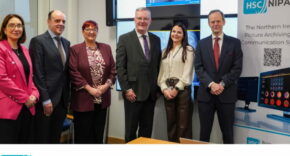0
7th May 2025 8:00 am

Following a recent report from the UK government, the use of AI-powered doctors’ assistants to speed up appointments is being hailed as a “gamechanger.” Interim trial data indicates that the technology has significantly reduced administrative burdens, allowing more time for direct patient care.
With the advent of AI, its potential applications across various industries have sparked conversations, particularly in healthcare, where the technology is seen as having great potential. From streamlining administrative tasks to enhancing diagnostic accuracy and personalising treatment plans, AI is poised to reshape the way care may be delivered in the future.
Antonio Espingardeiro, IEEE member and software and robotics expert provides insight into current applications of AI in healthcare as well as its future potential:
“We are increasingly seeing AI agents such as chatbots being used in healthcare settings. One of the first stages a hospital deals with is the triage of patients. So if we can chat to a bot when not feeling well by providing our symptoms, the AI system can then analyse large volumes of data and advise us to see a medical doctor in certain hospitals and clinics. This method can forward us to the right clinical service and reduce waiting times for consultation, which still is one of the biggest challenges today.
“Furthermore, teleconference tools, such as AI chatbots, allow doctors to be in contact with patients, so that distance is not a barrier for first care advice. As mentioned, today, one of the downsides of medical appointments is the fact that there is a mismatch between the time of examinations and the actual appointment with the GP. In most cases, this rapid analysis takes place at the time of consultation, which makes the work of the medical doctor even more difficult. In fact, the more complex the clinical scenario, the more tests will be needed, which increases the patient’s final diagnostic time.
“Of course, this represents a new age for care, though it is not a substitute for traditional clinics or hospital visits. However, the future of AI-enabled care remains promising, with chatbots being just the beginning. For example, already we are seeing cases where robots are aiding in patient surgery. These systems have a high degree of accuracy in their end effectors which allow surgeons, for example, to precisely cut and suture patients. We will continue to see more developments in teleoperated robots to act as extensions of the surgeon’s hands.”











